|
|
The Riverbend Down Syndrome Association is a 501(c)(3) non-profit organization and can receive tax deductible contributions. Our Employer Identification Number is: 14-1982424.
Save the date – Sunday, September 26th, 2010. Location: Tri-Township Park, Troy, IL. The Riverbend Down Syndrome Parent Support Group is organizing a Fall Picnic. A postcard with all the details will be mailed shortly. RSVP's are needed to plan for our catered event and to prepare for the games and activities that will be available. Hope to see you there!
- A warm welcome is extended to the following families to the Riverbend Down Syndrome Parent Support Group:
John and Karen Brewster – (Alexander: 11/24/2007)- Jason and Shannon Cooper – (Evan: 6/16/2006)
- Blair and Kim Schwalb – (Meredith: 10/13/2009)
- Mike and Sara Schwarz – (Alexander: 3/22/2009)
- Greg and Kristine Thomas – (Aubree: 5/25/2010)
Congratulations to last year's 2009 State Special Olympics Summer Games medalists:
Emmanuel Bishop (12) – Gold: Aquatics 400M Freestyle; Silver: Aquatics 200M Freestyle. [12 – Independent–Bishop].
Christian Bristol (32) – Gold: Aquatics 50M Breaststroke; Silver: Aquatics 50M Freestyle. [12 – Region 2 – Highland].
Karrie Brown (13) – Gold: Athletics 50M Run; Silver: Athletics Softball Throw. [12 – Collinsville Kahoks School District, Collinsville].
Ina Canady (25) – Silver: Athletics 50M Run [12 – Specialized Living Center].
Claire Eastwood (25) – Gold: Golf Individual Skills. [12 – Region 2 – Special Ed Co–op, Highland].
Maddie Harnar (11) – Level 2. Gold: Gymnastics Women's Vaulting; Silver: Women's Uneven Bars; Bronze: Gymnastics Women's All Around Competition; Bronze: Gymnastics Women's Floor Exercise. [12 – Belleville PTOEC].
Joe Kane (18) – Gold: Aquatics 4x25M Freestyle Relay; Silver: Aquatics 50M Freestyle. [12 – Alton School District].
Danielle Lanxon (12) – Level 2. Bronze: Gymnastics Women's All Around; Bronze: Gymnastics Women's Balance Beam; Bronze: Gymnastics Women's Vaulting. [12 – Belleville PTOEC].
Casey Marko (24) – Silver: Athletics 50M Run. [12 – Alton School District].
Kamali Mitchell (14) – Gold: Soccer Team Competition; Gold: Golf Individual Skills. [12 – Region 2 – Special Ed Co–op, Highland].
Lisa Newbury (38) – Gold: Powerlifting Deadlift. [12 – Region 2, Highland].
Amanda Schniers (17) – Bronze: Bocce Traditional Single. [12 – Clinton County, Germantown].
Erika Slimick (11) – Silver: Athletics 50M Run. [12 – BeDell ARC].
|
 |
Mike Stroh (23) – Bronze: Soccer Team Competition. [12 – Belleville PTOEC].
Jordan Kyle Stumpf (27) – Gold: Aquatics 100M Backstroke. [12 – Belleville PTOEC].
Parent Support Meeting
The Riverbend Down Syndrome Parent Support Group meets at 6:30 p.m. on the 4th Monday of each month at LeClaire Christian Church, 1914 Esic Drive, Edwardsville, IL 62025. Contact: Sara Schwarz and Tammy Wrobbel at: support@riverbendds.org. Aimee-Michelle Gower from Developmental Disability Services of Metro East, DDS, will be present at our next support group meeting, they are an independent service coordination agency serving persons with developmental disabilities and their families in Madison and St. Clair Counties.
Notes from the May Parent Support Meeting
Karla Haun, physical therapy assistant, shares techniques used to increase motor development for people of all ages.
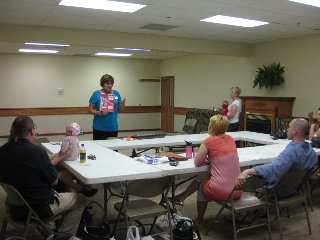 |
| Karla Haun, physical therapy assistant, shares
techniques used to increase motor development for people of all ages. |
|
|
|
We were fortunate to have Karla Haun, physical therapy assistant. She shared information about Brain Gym® and general gross motor techniques. Karla's presentation was useful for the families with both younger and older children. A few parents even joined in and attempted some of the Brain Gym® activities! Karla also shared some useful tricks of the trade that she uses to help motivate children so they can improve their motor skills while having fun.
Notes from the June Parent Support Meeting
Deb Goodman from IMPACT and a mother of a daughter with Down syndrome spoke about IMPACT and of the services the offer and presented information about funding for families to attend conferences offered by the ARC of Illinois and STARNet. She spoke about PUNS and places around the country that offer help with learning to live independently as well as college opportunities. Parents asked about including a Letter of Intention in the Special Need Trust. One parent brought a copy of the Educational Rights and Responsibilities - Understanding Special Education in Illinois that was shared around.
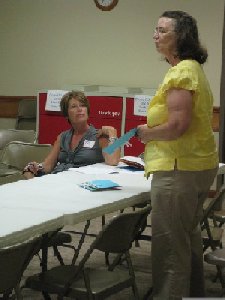 |
| Deb Goodman, June 2010 presenter. |
|
|
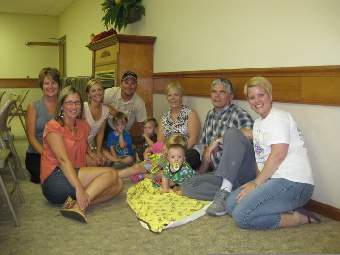 |
| (Left to right) Jennifer Bonner, Tammy Wrobbel, Shannon Cooper, Jason Cooper with Ethan and Evan, Jan Freitag with grandchildren Sidnee and Alex Schwarz, Mike Freitag and Sara Schwarz. |
|
Local Events
Friday September 24. Puttin' for Down Syndrome 6th Annual Charity Golf Tournament and Silent Auction to benefit the St. Louis Children's Hospital Down Syndrome Center and the Down Syndrome Association of Greater St. Louis at the Clinton Hill Golf Course, 3700 Old Collinsville Road, Swansea, IL 62226, (618) 277-3700. All donations are tax deductible. Times: 11:00 a.m. - Registration begins. 12:00 noon - Shotgun Start. For questions or additional information, contact: Tim Nienhaus (618) 236-1850 or (618) 799-8515, E-mail: puttinfordownsyndrome@yahoo.com.
Free golf clinic for individuals with Down syndrome will be held from 4:00 - 5:00 p.m. on the day of the golf tournament. For questions or to register by phone, call Cheri Nienhaus at (618) 236-1850, E-mail: dewdrop519@yahoo.com.
Stepping Up for Down Syndrome (SUDS)
Five families from Illinois where in the top twelve SUDS fundraisers to benefit the Greater St. Louis Down Syndrome Association:
- Brooklyn Schutte - Sigel
- Morgan Miller – Edwardsville
- Alexander Schwarz – Edwardsville
- Chelsey Johnston – Shelbyville
- Paige McWhorter – St. Elmo
- Additional Illinois families:
- Meredith Schwalb – Edwardsville
- Sophie Finn – Newton
- Jaycee Sandusky – McLeansboro
- Logan Gentry – Cahokia
- Maddie Harnar – Swansea
- Ainsley Baker – Litchfield
- Dylan Mach – Swansea
- Dalton Rauch – Newton
- Owen Lyday – Collinsville
- Alexander Brewster – Edwardsville
- Holly Wrobbel – Highland
- Elizabeth Mayfield [in memory of son Caleb] – Edwardsville
- Mercedez Farmer – Pittsfield
- Peyton Burgener – Vandalia
Our appreciation to Ashley Henna, DSAGSL Event Coordinator, for compiling this list.
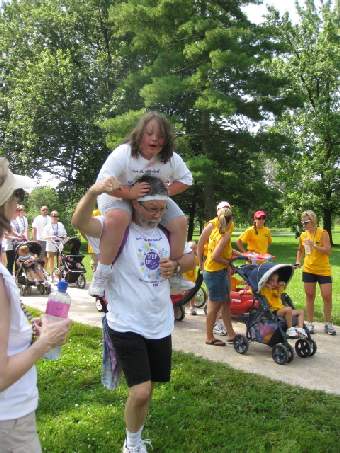 |
|
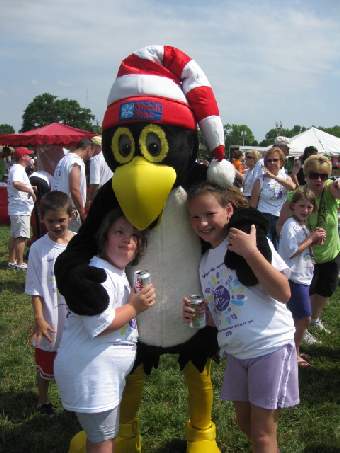 |
| Dr. Duff Wrobbel and daughter Holly at SUDS |
|
Holly Wrobbel with Eden and Prairie Farms' North Star® Frozen Treats Norton the Penguin |
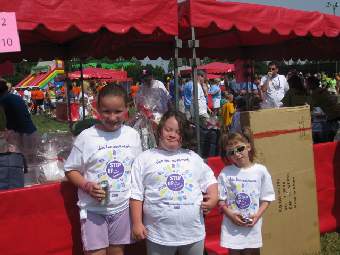 |
|
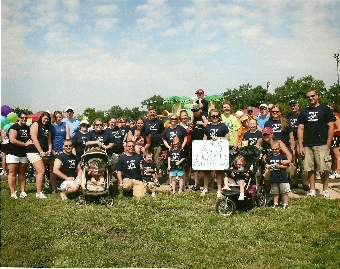 |
| Eden, Holly Wrobbel and Amelia checking out the raffle baskets |
|
Alexander (AJ) Brewster |
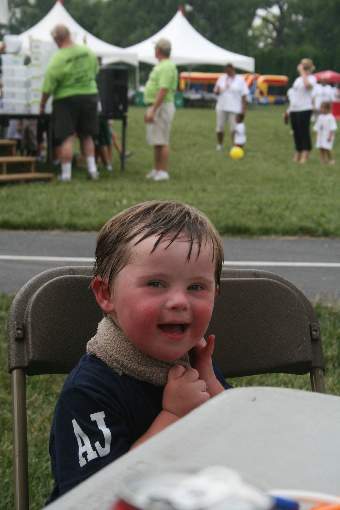 |
|
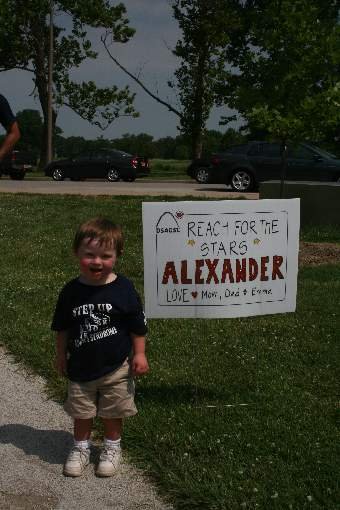 |
| Alexander (AJ) Brewster taking a rest |
|
Alexander (AJ) Brewster, age 2, in front of his AJ's Angels sign |
 |
|
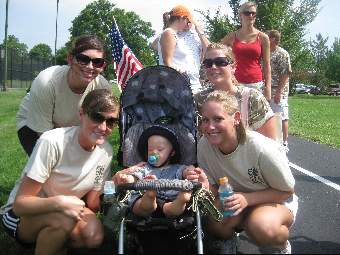 |
| |
|
Alexander Schwarz with friends from school at SUDS |
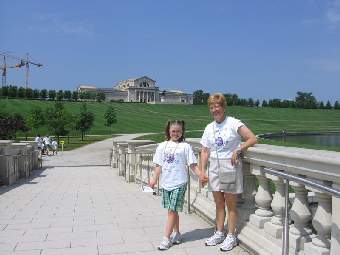 |
|
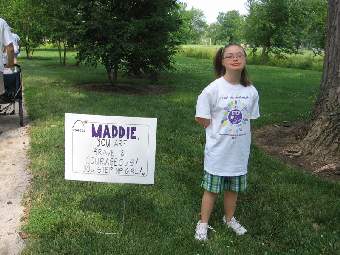 |
| Maddie Harnar with mother Kathy posing in front of the St. Louis Art Museum |
|
Maddie, you are brave and courageous! You step up girl! |
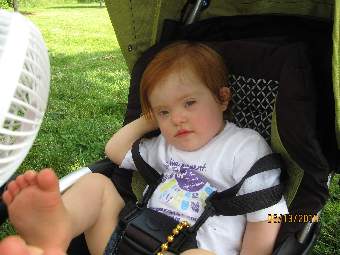 |
|
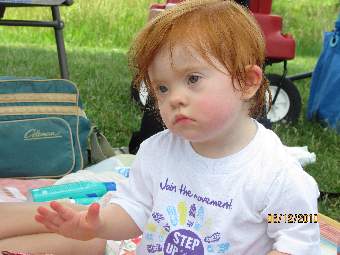 |
| Morgan Miller, two years old, taking a rest |
|
Morgan Miller, from fund raising top team "Morgan's March" at SUDS |
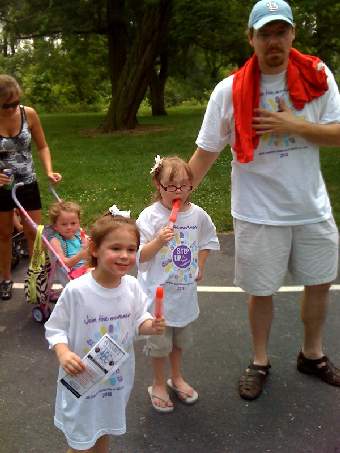 |
|
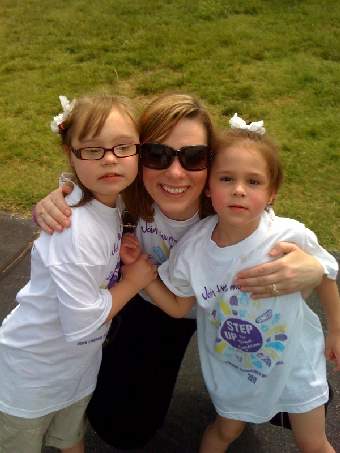 |
| Sister Ryenne Bair with McKenna and father Garet Bair |
|
McKenna Bair with mother Cori Bair and sister Ryenne enjoying the Walk together as a family |
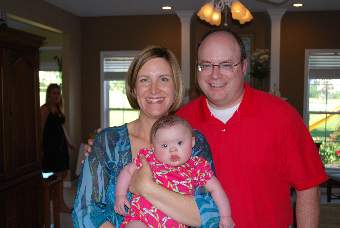 |
|
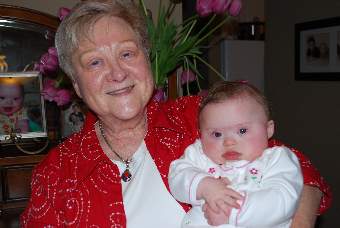 |
| Kim and Blair Schwalb with daughter Meredith, age 7 months |
|
Meredith Schwalb and her grandmother, Sue Otte, at home fundraising event for Meredith's SUDS team |
Down Syndrome Articles
An hour with Penny. Encountering Down syndrome by Amy Julia Becker. Copyright © 2010 by the Christian Century. Reprinted by permission from the January 12, 2010, issue of the Christian Century. Subscriptions: $49/yr. from P. O. Box 700, Mt. Morris, IL 61054. (800) 208-4097.
There were five of us around the table: my husband, myself, my mother, and two medical students who had been assigned to dinner at our house. One of them said, "My parents always wanted more for me–a better education than they had, and a better job, and a higher salary. A better life. So isn't it hard to have a child with a disability? Don't you want so much more for her?"
These young men were in the midst of a pediatric rotation, and they had one day to learn about children with disabilities. They had arrived at our house in the late afternoon. Penny, our three-year-old daughter, who has Down syndrome, greeted them. "Hi," she said, her neck craning to see their faces. Soon enough they were sitting cross-legged on the floor, with Penny pouring tea and offering "tookies."
They spent an hour playing, and once Penny was in bed we ate together and talked about our family. As the night went on, these young men grew more and more candid. They told us that earlier in the day they had been asked to consider four different types of disability: spina bifida, cystic fibrosis, Down syndrome and disfiguring burns. If they were a parent, which one would they want most and least for their child? In ranking those four categories, they had marked Down syndrome as the least desired.
Yet the reason they were telling us this story was that being in our home had changed their understanding of what it means to live with Down syndrome. When they left, they told us they were grateful for the evening not so much because it influenced their career as doctors, but because it had changed them as individuals. They had been humbled by the opportunity to come to value another human being, in this case a human being with Down syndrome.
A few days later I read Jesus' parable in Matthew 20 about the workers in the vineyard. It begins with familiar words, "The kingdom of heaven is like . . ." and tells the story of a landowner who hires workers at five different times over the course of a day and then pays them all the same amount. Jesus concludes with the statement, "So the last will be first and the first will be last."
It's a troubling story. It's designed to challenge people like the Pharisees, Jesus' original audience, and people like me, with plenty of resources and religious piety and a college degree. People like the medical students sitting at our table, earnest and confident and smart and accomplished. People who think that the value of a human being can be measured by salary, educational achievements and leadership positions. Who think that such success in life comes because we have earned it, and that others only need to work harder to achieve what we have, whether in matters of faith or finances.
I wasn't sure what to make of Jesus' words. Was I to conclude that diligence just doesn't matter? That God doesn't care what I do? Or, worse, that as someone who is "first" in this world, I am in trouble with God?
I think Jesus is getting at something more. The master doesn't devalue the workers who worked all day. He pays them what he had agreed to pay-a full day's wage. But he pays the workers who only worked an hour the same amount. He isn't devaluing those he hired first, but he is elevating those he hired last.
The workers hired last knew their status: outcast. Unemployed. Failure. Un worthy. By paying them first, and by paying them with a recognition that they had been trying to work all day long even if they hadn't actually been working, the landowner offers them a new self-understanding. Instead of seeing themselves as worthless, they can see themselves as valued. Just as valued as the winners, the ones who got the job with the contract at the beginning of the day.
And in a parallel moment, the last had become first when those medical students had dinner with us. I could envision Jesus at our kitchen table telling those students that for all their hard work and good grades and accolades, he didn't consider them any more important than this little girl with an extra 21st chromosome, with glasses, a speech delay and a hearing loss. I could envision Jesus explaining that they each had something of equal worth to contribute to God's work in this world. The kingdom of heaven had come among us, for just a moment, when those students saw Penny as a gift.
When Jesus makes a statement such as "The last will be first and the first will be last," he isn't just providing a picture of the end-times or heaven. He's inviting those of us who follow him to enter into that kingdom mentality right now.
Amy Julia Becker is an M.Div. student at Princeton Theological Seminary.
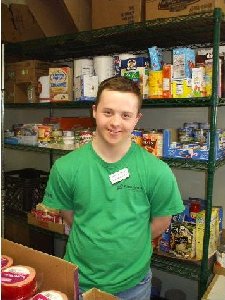 |
| Joe Kane, 19, who has Down syndrome, is a regular weekly volunteer at the center with his mother, Joan Kane. His responsibilities include packing breadboxes and restocking pantry shelves, while his mother is an intake person who works with the clients. |
'Joe Boss' - Volunteer puts skills to use at food pantry by Jennifer K. Hasamear, The Telegraph. July 12, 2010, p. 2A. URL: http://www.thetelegraph.com/articles/joe-42519-kane-center.html. © Copyright 2010 Freedom Communications. All Rights Reserved. Reprint permission granted by Dennis Grubaugh, City Editor, E-mail: DGrubaugh@thetelegraph.com.
"Joe Boss Kane," his nametag reads. Staff and other volunteers describe him as a volunteer with a good heart and a sense of humor.
"He is the official second boss around here," said Susan Jolley, executive director at Crisis Food Center Inc.
The pair started coming together to the center shortly after Joe's younger brother, Jack, finished his service hours at the center for confirmation about three years ago.
"Joe loves to help other people," Joan Kane said. "This gives him a sense of accomplishment and makes him feel good about himself."
Joe Kane said jokingly that he keeps coming back for the brownies.
"Sometimes I eat two, maybe three," he said, laughing
"On Thursdays, Joe will wake up and put on his green Crisis Food Center volunteer T-shirt and be ready to go," Joan Kane said.
Joe Kane said he enjoys working with food and people.
His responsibilities include packing breadboxes and restocking pantry shelves, while his mother is an intake person who works with the clients.
Restocking shelves and packing boxes is something he already knew how to do. He has worked at Schnucks in Godfrey for the last four years, bagging groceries, getting carts and putting away overstock.
Joe Kane attends Lewis and Clark Community College's College for Life program; swims with the Tri-City Area YMCA Tidalwaves; competes in the Special Olympics in swimming, track and field, and bowling; is a server at St. Mary's Church in Alton and loves the St. Louis Cardinals, especially Albert Pujols.
In June, Kane competed in the Special Olympics in Bloomington and won a bronze medal after taking third place in his division for the 50-meter run.
Crisis Food Center Inc. is one of 42 agencies funded by the Southwest Illinois Division of the United Way of Greater St. Louis. The funding received by the center helps for the continued operation for the food pantry.
Wendy's Wisdom: The Challenges and Accomplishments of a Woman with Down Syndrome by Sherry Skramstad, E-mail: sskramstad@gmail.com. © 2010 Sherry Skramstad. Tate Publishing, URL: http://wendyswisdom.tatepublishing.net/ Excerpt reprinted with the permission of the author.
When Wendy left her elementary school special class, at age seventeen, she was given a Certificate of Attendance in lieu of a diploma. Passing judgment on the value of her twelve years of education, Wendy said, "I learned how to salute the flag, make Kool-Aid and play the phonograph. It was just babysitting service!"
Those words haunted me into my adulthood and, I'm sure, played some part in my later decision to become a special education teacher. Wendy could neither read, write nor add or subtract on paper. Not withstanding that lack of instruction, she had an extensive collection of 45 RPM records (she always loved music!); many of which were on the Decca label and she could identify every single one of the dozen or so similar looking records from one another and play the song of her choice (or someone else's if she were so inclined) by just looking at the label! How could that have been possible since she was unable to read? Obviously she was astute enough to discern the difference in very small letters even though she could not name them and didn't know the sound(s) they made; a much harder task, indeed!
While a passenger in a car, in an unfamiliar neighborhood, Wendy could pick out a Chinese restaurant (a favorite of hers) from a block away by pointing to the sign with Chinese characters hanging above it. She obviously recognized the characters and differentiated them from other writing. What a waste of learning time were those twelve years of "babysitting service!"
Wendy had a curious mind that led her to ask, "Where does the water go when it goes down the drain?", when she was an eight year old sitting in the bathtub. I never asked or wondered about any such thing. Neither did my sister Valarie.
After I had earned my Masters Degree in special education and Wendy was already an adult living in a group home in Florida, I decided to try and teach her how to read during the three week summer vacation that she had from her workshop, which she spent near me in the Catskill Mountains. I was now familiar with several high interest, low level reading materials and chose a multi task approach to enhance her abilities in the short time we had available. I used flash cards of functional words she needed to recognize as well as phonics cards to teach her the sounds that letters make and how to blend them into words. (85% of the English language is phonetic.) We used two readers, in addition. One was a simple workbook of a family of sounds involving simple characters and simple sentences. The other was more of a functional workbook, created mostly for immigrants whose second language was English. It presented short paragraphs about actual daily living experiences, containing many functional words one would need to negotiate traveling the subways and buses, shopping in stores, etc.
I administered a pretest to Wendy before we began and, as expected, she scored as a non reader. After only three weeks, she had advanced to the middle of second grade reading (according to the posttest). Unfortunately, though I sent materials and written instructions back with her to Florida, no one kept up with the work of teaching her and her formal education stopped.
Web Wanderings
K-State, Texas Tech University Professors Release Preliminary Data from Down Syndrome Study. August 3, 2010. URL: http://www.k-state.edu/media/newsreleases/aug10/downsyndrome80310.html
MANHATTAN — The tumultuous feelings parents have when they first learn their child will be born with Down syndrome give way to joy and resilience, according to preliminary data from a study by researchers at Kansas State University and Texas Tech University.
Briana Nelson Goff and Nicole Springer, both mothers of a child with Down syndrome, can attest to the findings. [...]
Their study is called "My Kid Has More Chromosomes than Yours! The Journey to Resilience and Hope in Parenting a Child with Down Syndrome."
"The goal of our study is to help parents and professionals understand that having a child with Down syndrome isn't the end of the world; it can be a very positive experience," Goff said.
[...] "The majority said it was very devastating, and went through periods of depression, grief, mourning and shock, and felt scared, angry, disappointed or helpless," Goff said.
Father's Journal
Molto assonato
With closed eyes Emmanuel played and his violin tutor asked why; my son said that he was playing from memory or that he no longer needed the score, or he was focusing on the music or he really said he was sleepy.
|
|
However, once those initial feelings subsided, parents reported positive experiences and joy raising a child with special needs. [...] Experiences with medical professionals was an emerging theme not directly polled, Goff said. [...] the negative experiences involved medical professionals discussing abortion as the only option or parents feeling pressured into making a decision to abort.
"This was the biggest surprise to come from the results," she said. "I would expect this answer from parents who had their child 20 years ago, but not from parents who had their child within the past five years.
Goff said the parents reporting positive interactions were presented other options, such as adoption or raising the child. Some were even referred to local families raising a child with Down syndrome.
The survey is ongoing and is at https://surveys.ksu.edu/TS?offeringId=148766



















